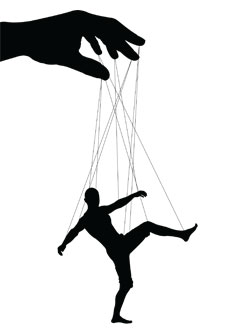 If ever there was an adage that over-simplified the essence of the co-dependent relationship, it is this: “Better the evil you know, then the evil you don’t know.”
If ever there was an adage that over-simplified the essence of the co-dependent relationship, it is this: “Better the evil you know, then the evil you don’t know.”
The classic example of the co-dependent relationship revolves around substance abuse, which is why one of the building blocks of such treatment regimens is disassociation with other habitual users or enablers.
However, based on my extensive experience treating Wall Street professionals for the last several decades, I have found that money is an equally potent enabler for obsessive, self-destructive, unhealthy co-dependent relationships.
Money influences a broad range of emotions between man and wife, shackling them with a common bond that intensifies other psychological issues.
For instance, I had a patient who was a 37-year-old financial services professionals employed by a well-known New York-based bank as a managing director specializing in institutional trading. He had achieved substantial success based on his proficiency with numbers, an attractive asset for this profession.
However, as good as he was with numbers, he was simply terrible at human relationships. He was aloof, detached, insensitive, emotionally insecure, lacking in charisma, and saddled with Attention Deficit Disorder. His ability to climb the Wall Street ladder and endure ADD was not surprising, when you consider that his hyper-vigilance helped enable him to manage this disability to some extent. He claimed to take his medications on schedule. However, based on his behavior and other data, it was obvious he was constantly undermining up his regimen. Unfortunately, he had not yet come to terms with his psychophysiological deficit, and the consequent need for medication.
His relationship with his wife can only be described as a co-dependent love/hate union. When his lack of discipline in his medication regimen did not keep his ADD under control, it undermined his marriage, as did the fact that he was also clinically depressed.
His wife had relational and sexual intimacy issues. She has never kissed him affectionately, with an open mouth, in 12 years of marriage; and she only participated in a single type of sexual intercourse. She grudgingly approached sex as a utilitarian wifely responsibility. She admitted that she married him out of an absolute fear of being alone and ending up a spinster like her mother’s sister, “Auntie.” They constantly wavered between divorce and marriage. She constantly referred to him as a “dick.” Her parents openly despised him. She was lost, depressed herself, fearful, and terrified of being alone. He was pathologically jealous, possessive, insecure, controlling, hostile, and paranoid. It was a horrific situation.
Yet, they both lived in utter fear of being alone. His position had afforded them a luxurious lifestyle, financial security and seeming stability. They both had a desperate and obsessive need to maintain their image in their community. They had locked themselves together in a sad, painful, loveless marriage, seemingly destined to live unhappily ever after.